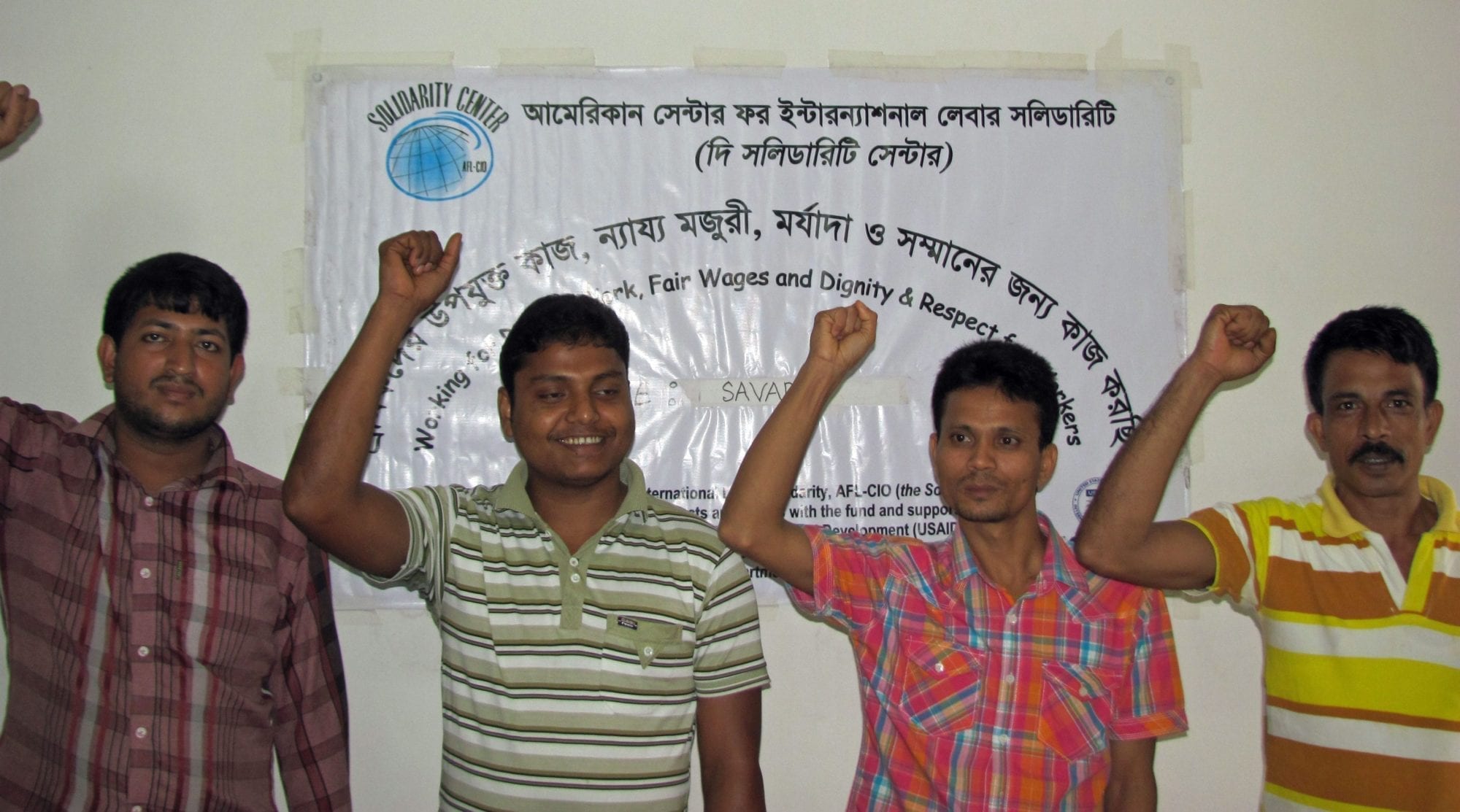
Jun 22, 2015
When Rafikul Islam, 25, president of a workers’ welfare association at a factory in the Dhaka export processing zone (EPZ) heard that one of the top factory officials harassed the female staff member responsible for the factory’s day care center, he took action.
“We called a meeting of our association and decided that we would protest this incident and write to the authorities to take action against the official,” Rafikul says. After they lodged a complaint, the official was terminated.
“This was possible because we were united. We never imagined such immediate action when there was no union in the EPZ.” Rafikul said there were similar incidents in other factories in the past but the victims did not get justice.
Despite obstacles, workers’ welfare associations are gaining ground in factories throughout Bangladesh’s export processing zones. Bangladesh derives 20 percent of its income from exports created in the EPZs, which are industrial areas that offer special incentives to foreign investors like low taxes, lax environmental regulations and low labor costs. Some 377,600 workers, the vast majority women, work in 497 factories in Bangladesh’s eight EPZs.
EPZ workers had long been denied the freedom to form unions, but in 2010, a law passed enabling workers to form unions under a different name—workers’ welfare associations. Associations are permitted to represent workers on disputes and grievances, negotiate collective bargaining contracts and collect membership dues. Now in the Dhaka EPZ alone, 40 of the 103 factories include workers welfare associations.
But unlike traditional unions, the associations cannot interact nor affiliate with any labor union, nongovernmental organization or political organization outside the EPZ. Associations can only form a federation within one zone.
Kholilur Rahman, 20, general secretary of an association of another factory in the Dhaka EPZ says that after forming an association, workers became aware of their legal rights.
“Most of the workers in our factories were contractual workers,” he says. “Authorities did that purposefully to deprive us from receiving benefits. But after forming the association, the factory management made us permanent,” Kholilur said.
Oliur Rahman, a member of an association in the Dhaka EPZ, says that in the past, managers terminated them for trivial reasons.
“But this is not the case after we formed an association and voted for our association and elected the officers for our workers’ welfare association,” he said.
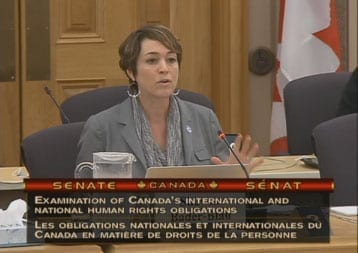
Jun 11, 2015
The global economy generally is unregulated and the system encourages multinational corporations to operate or source from countries where wages are low, laws to protect human rights are few or unenforced and workers are impoverished and vulnerable, Shawna Bader-Blau, Solidarity Center executive director, said before the Canadian Parliament Monday.
“Unfortunately, the horrifying working conditions that led to the Rana Plaza collapse and the deadly Tazreen Fashions fire just six months prior are not unique to Bangladesh. In developing countries around the world, we see building codes go unenforced, and health and safety standards ignored,” Bader-Blau told the Senate Standing Committee on Human Rights.
The Canadian Senate committee held the hearing, “Corporate Social Responsibility and Garment Workers,” to monitor human rights issues and to review how the Canadian government addresses its international and national human rights obligations.
Bader-Blau emphasized that improving workplace conditions above all requires involving working people in the process—and that means workers must be able to form unions and bargain over their wages and working conditions with employers.
She recommended several steps to address the growing global crisis in which low wages, few jobs and exploitative working conditions increasingly becomes the norm. Governments “have important tools to improve human rights conditions for workers, including trade arrangements and legal requirements for accountability in supply chains,” she said.
Further, global corporations must support the human rights of their workers. As a start, global corporations should “fully embrace the United Nations guiding principles on business and human rights as a floor and aggressively move their implementation across the supply chain,” Bader-Blau said.
“Treat human rights with a level of priority you treat pricing and quality control. Global corporations have figured out how quality control can be maintained across their supply chain. How about worker rights?”
The bottom line, she said, is that no amount of legally unenforceable, nicely worded social-responsibility promises is ever going to resolve the abuses perpetuated on a vulnerable workforce.
“Rather, workers’ ability to organize and collectively raise concerns to management because they have the strength of a union is the only realistic approach to ensuring that they know and can exercise their rights. Without a union, individuals who complain can be threatened, fired or even killed into silence. Together, they are a force for improvement.”
Others testifying before the committee included Shannon Brown, Fairtrade Canada Business Development and Commercial Relations director; Sofia Molina, Fairtrade Canada category specialist for coffee; and Bob Jeffcott, co-founder and policy analyst for the Maquila Solidarity Network.
See Bader-Blau’s full testimony, starting at 77:55.
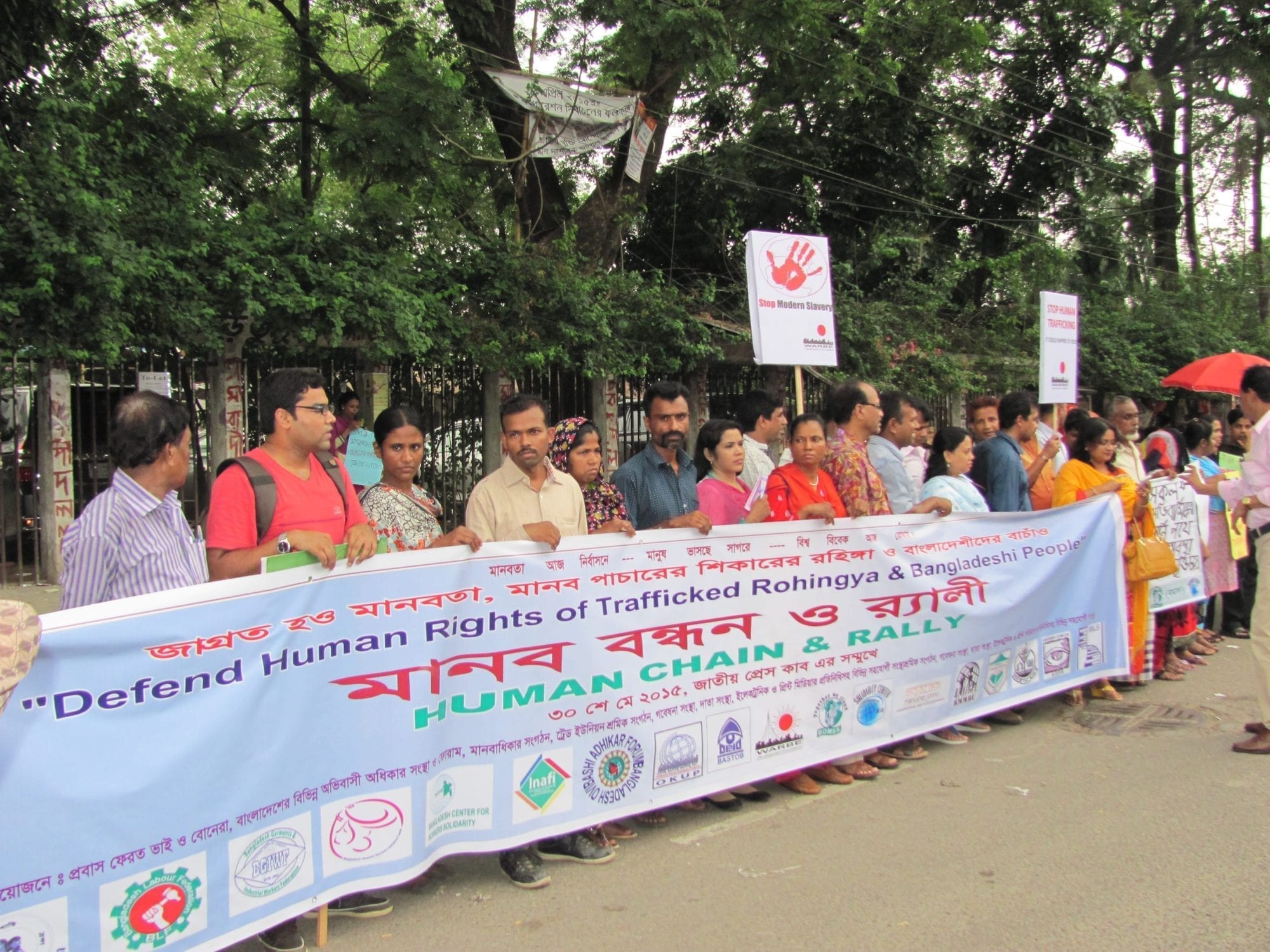
Jun 5, 2015
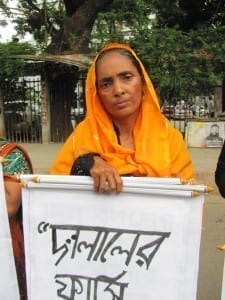
Selina Begum’s son has been missing at sea since he migrated for work. Credit: Solidarity Center/Mushfique Wadud
Selina Begum, 60, traveled from Bangladesh’s northeast Narshindi district to Dhaka, the capital, for one reason, she says: “I want to know the whereabouts of my son.”
Selina’s son, Taizul Islam Rakib, 22, is among the thousands of workers and their families who have migrated overseas to find jobs. Selina says she glimpsed her son in a television news story on the plight of migrants abandoned on boats, but has not heard from him.
Over the weekend, Selina joined dozens of those with missing loved ones in a human chain in downtown Dhaka, where they carried signs, “Punish the trafficking traders,” and held a press conference demanding the government take action. They were joined by repatriated victims of human trafficking like Abdur Rahman, 40, who was rescued from Malaysia and returned to Bangladesh.
“I did not get anything to eat for 22 days and just survived by eating tree leaves,” Abdur said, describing his journey to Malaysia.” “I never thought I would survive.”
Fulmoti, 35, has been waiting for a phone call from her husband Faruk Hossain, 40, who set out for Malaysia by sea on April 14. “My morning starts with the hope that my husband would phone me, but every night I go to bed feeling hopeless,” says Fulmoti, a mother of two.
The event was organized by 19 labor and human rights organizations, including the Solidarity Center and its allies, the Bangladesh Center for Workers Solidarity (BCWS), the Bangladesh Garment and Industrial Workers Federation (BGIWF) and the Bangladesh Independent Garment Workers Union Federation (BIGUF). The coalition issued a joint statement urging governments in origin and destination countries to take immediate action to repatriate migrants and punish traffickers.
Speaking at the event, Syed Saiful Haque, chairman of WARBE Development Foundation, a Bangladesh emigrant rights group, said that the immediate repatriation of trafficking victims should be governments’ first priority. In addition, said Syed Sultan Uddin Ahmmed, assistant executive director of the Bangladesh Institute of Labor Studies, the government must take action against the leaders of trafficking chains.
The event stems from a decision by members of WARBE, the Bangladeshi Ovhibashi Mohila Sramik Association (BOMSA) and Solidarity Center to work together in raising the issue of trafficked migrants. The group is asking the Bangladesh government to take steps to repatriate trafficking victims and rehabilitate them; demanding prosecution of traffickers; and urging the government to work with other concerned governments to prevent stop criminal trafficking.
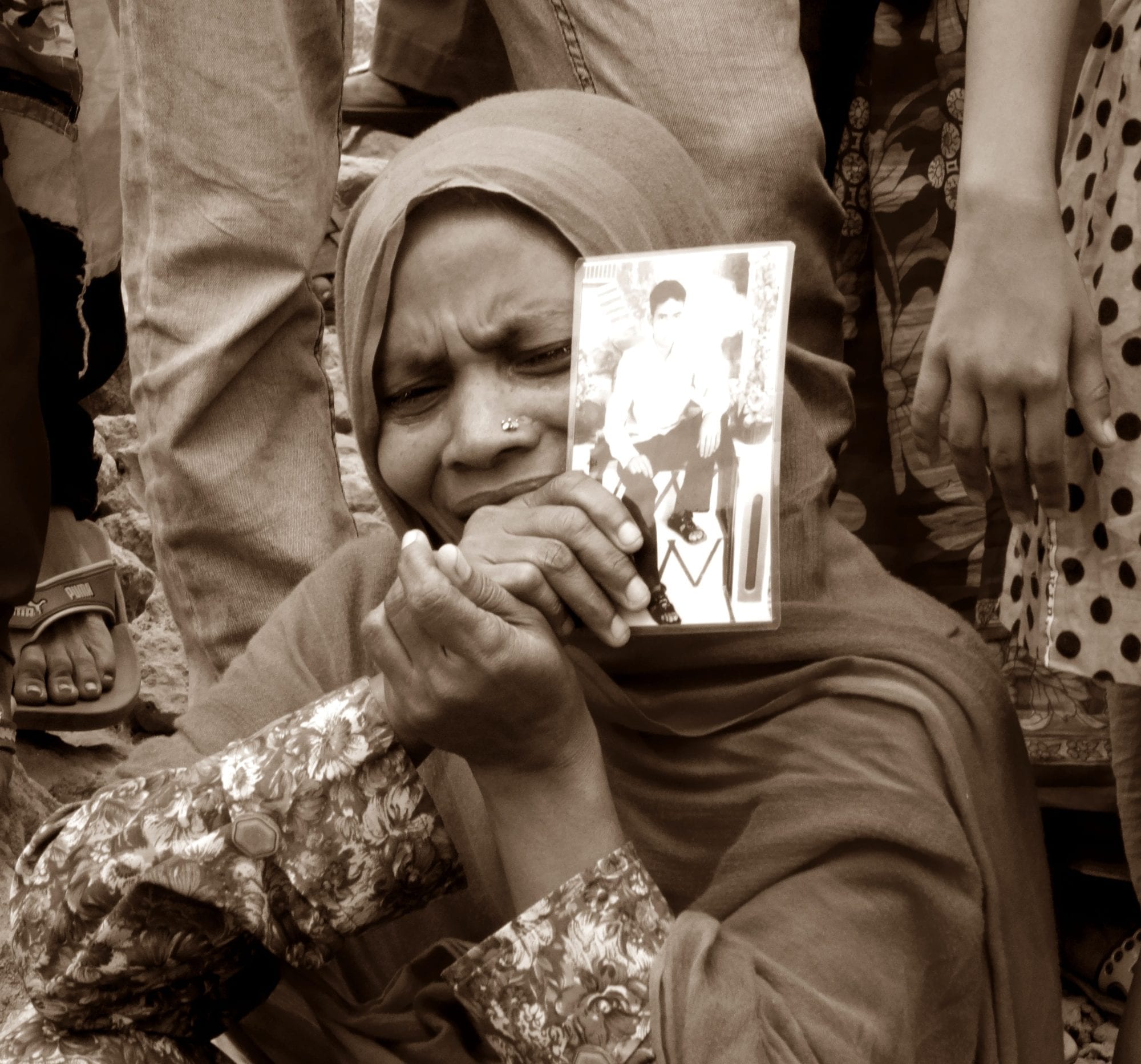
Jun 2, 2015
Reports that at least 41 government officials have been charged in the deadly 2013 collapse of Rana Plaza in Bangladesh “represent a long-delayed step toward justice,” says Solidarity Center Asia Regional Program Director Tim Ryan.
“Finally, after more than two years, the Bangladesh government is moving toward holding accountable those who were responsible for the deaths and injuries of hundreds of women and men toiling for pennies in those five garment factories,” Ryan says. “Rana Plaza was the Bangladesh’s worst-ever industrial disaster, and ensuring the justice process works is the absolute minimum the government can do for those who lost loved ones or were injured in the Rana Plaza disaster.”
Sohel Rana, the owner of the building; his parents, the owners of several factories in the building; and at least a dozen government officials were formally charged yesterday, according to the New York Times, citing a state prosecutor, Anwarul Kabir, who is part of the legal team that will pursue the case. At least 17 individuals have been charged with murder, while others face lesser charges, like violating building codes.
More than 1,100 garment workers, mostly women, were killed when the multistory Rana Plaza building pancaked on April 24, 2013. Thousands more were severely injured, many of them now unable to work and support their families. The building housed five garment factories.
A Bangladesh government inquiry in May 2013 concluded that substandard construction materials and the vibration of heavy machinery in the five garment factories were prime triggers of the building’s collapse. Sohel Rana, a prominent leader in the nation’s ruling party, was arrested shortly after over the disaster as he tried to flee to India.
A structural engineer inspecting the building the day before it collapsed found structural cracks, and retail workers in the building were told to stay home. Despite the engineer’s warnings, Rana told factory operators the building was safe. Factory owners then demanded workers return the next day and work; some were threatened with the loss of a month’s pay if they did not go back to the factory floor.
If convicted, the accused could face the death penalty, according to the New York Times, citing Bijoy Krishna Kar, the investigating officer who filed the charges on Monday.
Bangladesh garment factories are notoriously unsafe. Although Rana Plaza served as wake-up call to authorities, factory owners and Western brands, who are now taking steps to remedy the situation, workers still are injured or die on the job. According to data gathered by the Solidarity Center in Bangladesh since November 2012, the garment sector has seen at least 84 fire incidents injuring more than 900 workers and killing more than 31 workers.
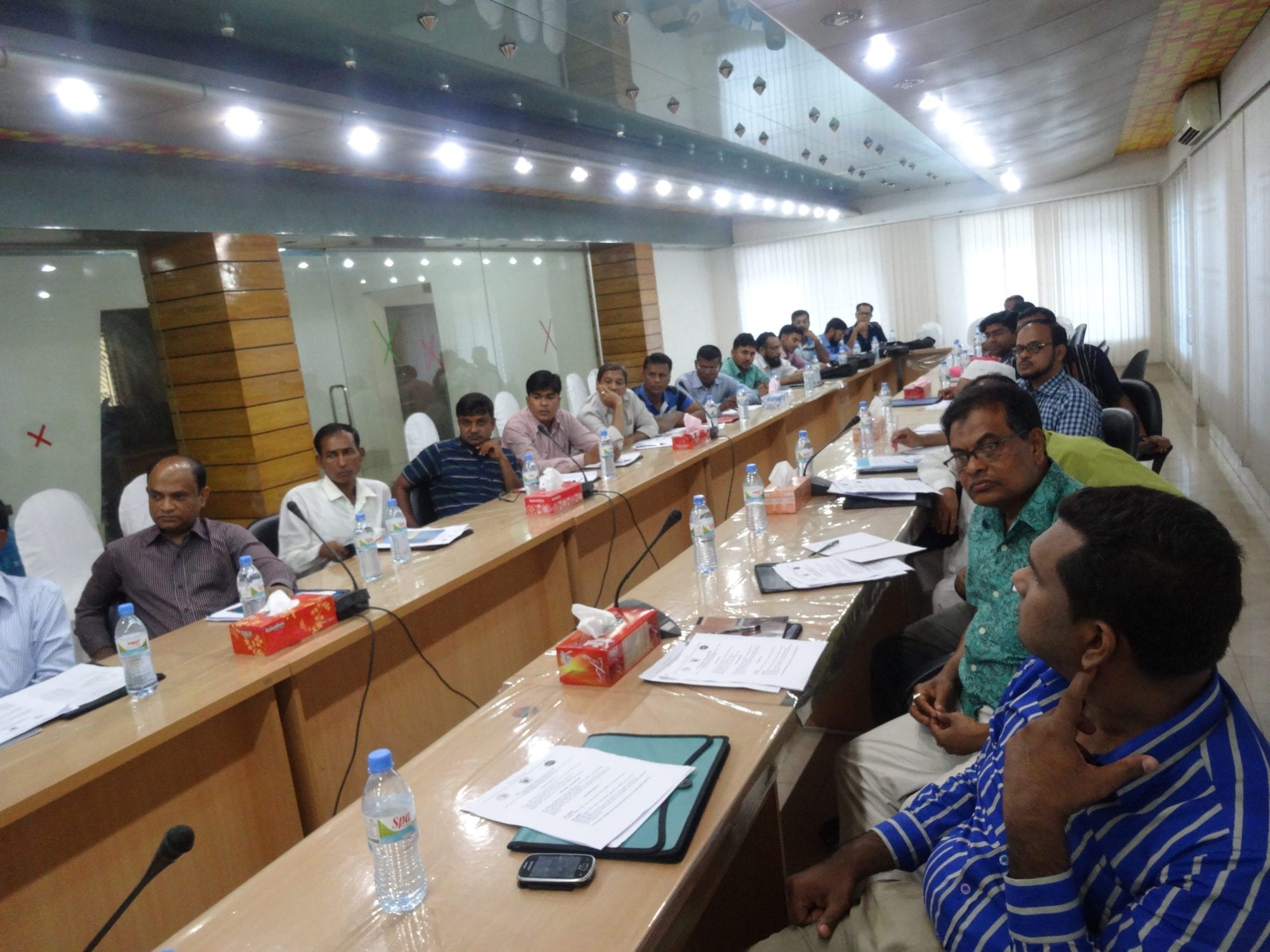
May 14, 2015
Bangladesh shrimp industry owners, management officials and labor and human rights activists discussed and debated the dispute resolution process in the country’s shrimp industry at a recent workshop organized by the Solidarity Center, the Bangladesh Frozen Foods Exporters Association (BFFEA) and Bangladesh Shrimp and Fish Foundation (BSFF).
The alternative dispute resolution process was instigated in 2013 when BFFEA, BSFF and the Solidarity Center signed a groundbreaking memorandum of agreement (MoA).
Under the MoA, shrimp industry owners and managers agreed to implement worker rights according to Bangladesh labor law and International Labor Organization (ILO) core labor standards and to give the nearly 1 million shrimp workers who toil during peak season across the supply chain the right to form trade unions.
Among the participants, who included production managers, compliance officers and managing directors, BFFEA Senior Vice President Golam Mostafa said he hoped the dispute resolution mechanism in the shrimp industry would be an example other industries will follow. Solidarity Center-Bangladesh’s MoA project consultant and former secretary of Bangladesh government AKM Zafar Ullah Khan said that alternative dispute resolution and participation committee is important for a sustainable shrimp sector.
Solidarity Center’s Bangladesh staff also addressed questions about pending cases, worker compensation and the overall process.
Alonzo Suson, Solidarity Center Bangladesh country program director, stressed the need for promotion, outreach and education to make workers aware of the alternative dispute resolution process. Suson praised the MoA and said he had heard that labor-management relationships were improving because of the joint initiative.
The Solidarity Center began working with Bangladeshi nongovernmental organizations in 2005 to look at ways to ensure the rights of shrimp workers are protected at the workplace. In 2012, the Solidarity Center issued its second in-depth report on the issue, “The Plight of Shrimp-Processing Workers of Southwestern Bangladesh.”






